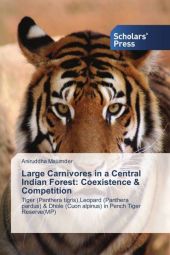 Neuerscheinungen 2016Stand: 2020-02-01 |
Schnellsuche
ISBN/Stichwort/Autor
|
Herderstraße 10
10625 Berlin
Tel.: 030 315 714 16
Fax 030 315 714 14
info@buchspektrum.de |

Aniruddha Majumder
Large Carnivores in a Central Indian Forest: Coexistence & Competition
Tiger (Panthera tigris),Leopard (Panthera pardus) & Dhole (Cuon alpinus) in Pench Tiger Reserve(MP)
2016. 276 S. 220 mm
Verlag/Jahr: SCHOLAR´S PRESS 2016
ISBN: 3-659-84141-2 (3659841412)
Neue ISBN: 978-3-659-84141-5 (9783659841415)
Preis und Lieferzeit: Bitte klicken
Conservation of large carnivore is a global priority as their population and habitat is facing tremendous threat due to growing human population & development. In many protected areas of India, up to date information on their coexistence pattern remains negligible.To supplement the current basic information, a detailed long-term study on prey selection, habitat utilization and population dynamics of three sympatric large carnivores (tiger, leopard and dhole) was documented in this book. The present study was conducted in Pench Tiger Reserve (Pench), Madhya Pradesh of Central India from May 2006 to April 2011.The study results highlighted both the potential and the difficulties involved in multi-species conservation planning as all three carnivores showed plasticity to remain in different forested habitat of Pench, segregating spatially and temporarily with each other. This observed spatio- temporal segregation between these carnivores to reduce inter-specific competition may have influence in their co-existence in this tropical forest. This book also addressed various challenges on conservation of large carnivores in a human dominated landscape and their conservation implication.
Dr Aniruddha Majumder is working on large carnivores in Central Indian Landscape for more than ten years at various research projects under Wildlife Institute of India (Dehradun,India) and State Forest Research Institute (Jabalpur, M.P.,India).He is the author of various research papers,reports, popular articles and manuals on large carnivores.


